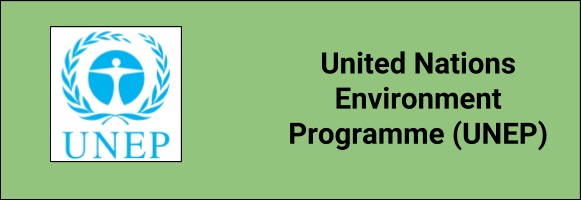NEW! The Gist (FREE) | E-BOOKS |
United Nations Environment Programme (UNEP)
United Nations Environment Programme (UNEP)
Founded as a result of the United Nations Conference on the Human Environment in June 1972 and has its headquarters in Nairobi, Kenya.
Major Programmes:
- Billion Tree Campaign
- Clean up the World
- Earth Hour
- Pain for the planet
- Seal the Deal
- TUNZA
- APELL
Functions of UNEP
- developing international environmental conventions,
- promoting environmental science and information
- working on the development and implementation of policy with national governments, regional institutions in conjunction with environmental Non-Governmental Organizations (NGOs)
- funding and implementing environment related development projects
- formulation of guidelines and treaties on issues such as the international trade in potentially harmful chemicals, transboundary air pollution, and contamination of international waterways.
Buy Printed Complete Study Materials for UPSC IAS PRELIMS Exam
Online Crash Course for UPSC PRE Exam
Clean Up the World
- It is a community-based, environmental campaign that inspires and empowers communities around the globe to clean up, fix up and conserve their environment.
- Clean Up the World Weekend is celebrated globally on the 3rd weekend in September each year
- Clean up the World was established in 1993, after Clean Up Australia founders, Ian Kiernan and Kim McKay, approached the United Nations Environment Programme (UNEP), with the idea of taking the Clean Up Australia concept globally.
- UNEP assists Clean Up the World to promote the campaign and encourages participation through its networks.
- Clean Up the World activities include:
o Recycling and resource recovery
o Tree planting
o Education campaigns
o Water reuse and conservation
- Competitions
- Exhibitions
The Billion Tree Campaign
- The Billion Tree Campaign was inspired by Nobel Peace Prize Laureate Wangari Maathai, founder of the Green Belt Movement.
- The Billion Tree Campaign was launched in 2006 by the United Nations Environment Programme (UNEP) as a response to the challenges of global warming, as well as to a wider array of sustainability challenges, from water supply to biodiversity loss. Its initial target was the planting of one billion trees in 2007.
- The billionth tree, an African Olive, was planted in Ethiopia in November 2007. The two billionth tree took root as part of the United Nation’s World Food Programme agroforestry initiative.
- In December 2011, after more than 12 billion trees had been planted, UNEP formally handed management of the program over to the not-for-profit Plant-for-the-Planet Foundation, based in Munich, Germany.
Earth Hour
- Around the globe, millions of people, businesses, and landmarks set aside an hour to host events, switch off their lights, and make noise for climate change action. This year Earth Hour is at 8:30pm on 24 March 2018.
- It is organized by the World Wide Fund for Nature (WWF)in coordination with UNEP
- It was started as a lights-off event in Sydney, Australia, in 2007.
- Earth Hour does not purport to be an energy/carbon reduction exercise, it is a symbolic action.
Awareness and Preparedness for Emergencies at Local Level (APELL)
- Started in 1988 in response to a number of chemical accidents that resulted in deaths and injuries, environmental damage, and extensive economic impacts in the surrounding communities.
- The objectives of APELL are to:
- Identify and create awareness of hazards and risks
- Initiate measures for risk reduction, accident prevention and mitigation
- Develop coordinated preparedness among the local industry, authorities and community
- Within the context of the Sendai Framework for Disaster Risk Reduction (2015-2030), UN Environment developed the Second Edition of the APELL Handbook launched in 2015. This new edition highlights the importance of an integrated multi-hazard approach at local level, and emphases the importance of multi-stakeholder and all-of-society engagement.
TUNZA
- Started in 2003 by UNEP as a long-term strategy for engaging young people in environmental activities and in the work of UNEP.
- The word “TUNZA” means “to treat with care or affection” in Kiswahili (a sub-regional language of Eastern Africa).
- It is meant to develop activities in the areas of capacity building, environmental awareness, and information exchange, with a vision to foster a generation of environmentally conscious citizens, capable of positive action.
- In order to implement this strategy UNEP's main corporate partner is Bayer.


